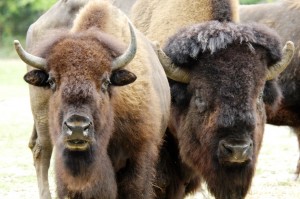By Ciji Taylor, USDA Natural Resources Conservation Service
With the help of a USDA Natural Resources Conservation Service grant, the American Indian Inter Tribal Buffalo Council is working to make tribal lands more resilient to drought.
The Conservation Innovation Grant will give $640,000 to the council to help bridge the knowledge between 58 tribes spanning over one million acres in 19 states with a collect heard of more than 15,000 buffalo.
“The council’s mission is to restore bison to tribal land, which is subject to the whims of the land like fire, drought and carrying capacity,” Jim Stone, ITBC executive director, said.
To tribes, buffalo represent a way of life and are a critical part of the ecosystem, making their survival through drought a deep cultural significance, he added.
“American Indians were our nation’s first conservationists. This (grant) project will help make sure tribes have the resources and knowledge to improve and conserve land for their future generations,” Dr. Carol Crouch, NRCS National American Indian Special Emphasis Program manager, said.
The first step of the project will be an assessment of the impacts of drought across member tribes, their response to drought, and the effectiveness of the responses. The findings will be used to create regional trainings and adoption of best management practices
“Often, our members don’t know where to get information or resources for drought. Our goal is to build a one-stop shop for tribes where they can easily access the most up-to-date information,” Stone said.
An online database will be created for tribes to find drought resources. It will include links to drought forecasts, drought funding assistance, management practices, and the data needed to fill out forms and grants for assistance.
“This is a big project to tackle, and we currently only have six staff members,” said Stone.
The grant allows the council to hire additional staff to help do drought assessments, trainings, the online database, and bring in other partners to help educate the tribes.
Overall, it’s a chance to protect the land, the buffalo, and a way of life, he added.
Visit NRCS’s website for more information on drought and CIG grants.
USDA’s Natural Resources Conservation Service helps America’s farmers and ranchers conserve the Nation’s soil, water, air and other natural resources. All programs are voluntary and offer science-based solutions that benefit both the landowner and the environment.
Follow NRCS on Twitter. Checkout other conservation-related stories on USDA Blog. Watch videos on NRCS’ YouTube channel.


